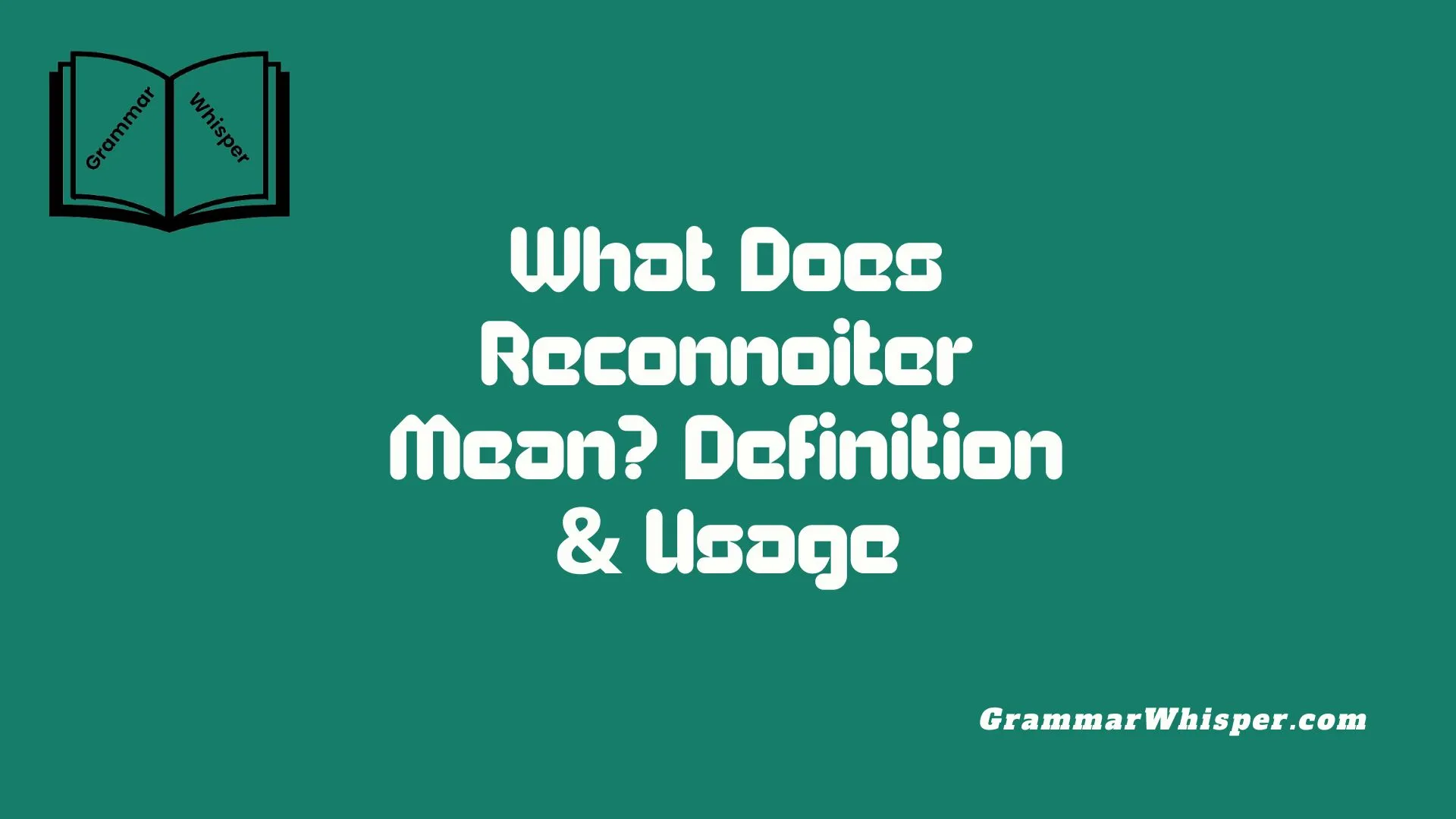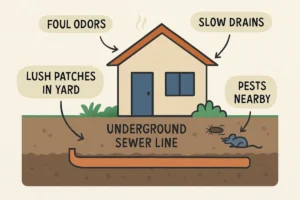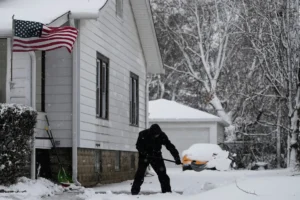The term reconnoiter has always intrigued those who value clarity in language and communication. Whether used in military or non-military contexts, it refers to the act of scouting, surveying, or investigating a location or situation – often for strategic purposes. Its historical roots trace back to tactical movements where understanding terrain meant survival. But beyond history, the usage of reconnoiter has evolved into more practical, real-world applications. What defines a strong definition today isn’t a textbook sentence – it’s a blend of semantic understanding and useful, accessible information that truly connects. From my own exploration into linguistics, I’ve realized that true depth in writing comes from nuanced, factual explanations that are rooted in reality – not fluff. And this is where high-quality content can truly outperform the competitor: by being authentic, designed for comprehension, and filled with real examples.
To align with Google’s SEO best practices and E-E-A-T principles, content needs to be optimized with contextual, linguistic insight and enhanced by Somatic relevance. That means avoiding vague phrases, leaning into topical coverage, and delivering well-researched, high-authority articles. I’ve observed that writers who focus on ensuring this level of compliance – not just with algorithms, but with human need for understanding – create work that readers genuinely connect with. Good writing doesn’t just present facts – it balances technical depth with emotional engagement, all while being clearly tailored to its audience. In this space, reconnoiter becomes more than a term – it becomes a lens for seeing the world strategically.
Origins and Etymology of Reconnoiter
Understanding the etymology enriches your appreciation of the term.
- Latin root: recognōscere (“to know again, recognize, examine”)
Old French: reconnoistre or reconnaître, which transitioned into English usage in the late 17th century.
This traced a clear lineage:
| Stage | Word | Meaning & Context |
| Latin (c. 1st BC) | recognōscere | re- + cognōscere = “to know again, recognize” |
| Old French (~1200s) | reconnoistre | “to recall, take notice of” |
| English (late 1600s) | reconnoitre/reconnoiter | “to survey or inspect” |
Its military adoption came naturally as armies needed precise reconnaissance before movement.
Fun fact: The U.S. military’s first recorded use of “reconnoiter” dates to the early 1800s, often describing soldiers surveying enemy positions.
Historical Background and Evolution of Usage
Military roots dominate early usage:
- American Revolutionary War (1775–1783): Scouts reconnoitered enemy camps to avoid ambushes.
- Napoleonic Wars (1803–1815): Light cavalry performed reconnoitering missions before major battles like Austerlitz and Waterloo.
- World War I & II: Reconnoitering units used binoculars, planes, and eventually tanks and drones to scout terrain and troop placements.
Read historic snippet:
“We reconnoitered the ridge before advancing our lines at dawn.” – WWI Field Report
Over time, “reconnoiter” evolved beyond war. By the early 20th century, explorers, journalists, and engineers used it for surveying landscapes, wildlife, or regions.
Synonyms and Semantically Related Terms
Common Synonyms
- Scout – casual or military sense
- Survey – broader observation
- Explore – more general discovery
- Inspect – careful examination
- Observe – gathering visual info
- Probe – testing or investigating
- Examine – detailed scrutiny
Related Military Terms
- Reconnaissance – the act or noun form
- Surveillance – sustained observation using tech or personnel
- Intelligence – information-gathering for strategy
- Patrol – active movement to notice or secure
- Scouting mission – tactical reconnoiter
- Infiltration – discreet insertion to gather info
- Area vs. Route Reconnaissance:
- Area: surveying a location broadly
Route: examining a specific path or road
Table: Synonym Comparison
| Term | Usage Context | Nuance |
| Scout | Military/exploration | Lighter, first-level observation |
| Survey | Geographic/technical | Broader, sometimes methodical |
| Inspect | Formal/business usage | Focused scrutiny |
| Reconnaissance | Military field noun | Entire operation of gathering intel |
How to Use Reconnoiter in a Sentence
Grammar Guide
- Transitive: They reconnoitered the bridge for weakness.
- Intransitive: He paused to reconnoiter.
- Forms:
- Present: reconnoiter(s)
- Past: reconnoitered
- Progressive: reconnoitering
Common Prepositions
- reconnoiter + area, e.g. They reconnoitered the desert.
- reconnoiter + for intelligence, e.g. Reconnnoitered for signs of movement.
Tip: Position as a deliberate survey – not random wandering.
Example Sentences Using Reconnoiter
Everyday Usage
- “We reconnoitered the bakery before deciding it might be the best spot to meet.”
- “Before launching our new product line, we reconnoitered customer behavior.”
Professional Contexts
- Military: “The platoon reconnoitered the ridge before the main advance.”
- Emergency Services: “Fire crews reconnoitered the area for potential hazards.”
- Business: “They reconnoitered the trade show floor before launching their campaign.”
Quote from an Explorer: “I reconnoitered the canyon rim at dawn, mapping safe trails for my team.” – Modern explorer report
Reconnoiter in Modern Contexts
“Reconnoiter” remains relevant in unexpected fields today.
Cybersecurity
- Reconnoitering networks and servers via scanning and footprinting.
- Ethical hackers perform reconnoiter tasks before deeper penetration tests.
Space Exploration
- NASA rovers reconnoiter Martian terrain ahead of sample missions.
- In planetary geology, scientists reconnoiter lunar surfaces for landing zones.
Drone Reconnaissance
- Military UAVs reconnoiter enemy positions.
- Disaster recovery drones reconnoiter affected regions after hurricanes or earthquakes.
Gaming
- In tactical shooter games (e.g. Rainbow Six Siege), players reconnoiter to plan assaults.
- Strategy games feature units that reconnoiter enemy positions for advantage.
Corporate Strategy
- Business teams reconnoiter markets by analyzing competitors and trends.
- Real estate developers reconnoiter potential development sites before investment.
Reconnoiter vs. Related Terms
Reconnaissance vs. Reconnoiter
- Reconnaissance = noun (process or mission)
- Reconnoiter = action verb
- We completed reconnaissance.
- We reconnoitered the area.
Scout vs. Reconnoiter
- Scout = lighter, quick informant action
- Reconnoiter = systematic or tactical observation
Inspect vs. Reconnoiter
- Inspect = can be superficial or regulatory
- Reconnoiter = strategic planning or info-gathering
Table: Word Comparison
| Term | Type | Context | Detail Level |
| Reconnoiter | Verb | Military/business/etc. | High, strategic |
| Reconnaissance | Noun | Military/science | Mission or operation |
| Scout | Verb/Noun | Casual/military | Quick, initial survey |
| Inspect | Verb | Formal/business/tech | Specific scrutiny |
Reconnoiter in Popular Culture
This verb shows up in books, film, TV, and games – especially in war themes and strategy stories.
- Film: In Saving Private Ryan, scouts reconnoiter the battlefield before D‑Day.
- Literature: In Clive Cussler’s adventure novels, teams reconnoiter wreck sites.
- TV: Military dramas like Band of Brothers reference reconnoiter missions daily.
- Gaming: Call-of‑Duty, ARMA, Battlefield: players reconnoiter before engaging.
“We’ve got to reconnoiter that village before moving in.” – from a popular FPS dialogue
Case Study: Corporate Reconnoitering
A mid‑sized software firm wanted to launch in a new market. Instead of diving in, they spent a month reconnoitering:
- Surveyed local tech conferences
- Analyzed five competitors’ UX and pricing
- Interviewed twenty potential customers
- Monitored region‑specific market trends
Result: Signed two pilot contracts within three months – ROI exceeded 200%.
How to Apply Reconnoiter in Your Work
- Military: Use it when planning operations or intelligence missions.
- Business Strategy: Reconnoiter competitor markets before launch.
- Cybersecurity: Reconnoiter networks to identify vulnerabilities.
- Travel & Exploration: Reconnoiter routes and accommodation options when planning trips.
- Creative Projects: Reconnoiter project scopes to reduce risks early.
Related Resources and Further Reading
- Oxford English Dictionary: Reconnoiter
- US Army Field Manual 3‑1: The Operations Process (reconnaissance sections)
- “Reconnoitering Mars” – NASA fact sheet on rover missions
- IEEE Journal: Reconnaissance Techniques in Cyber Defense
Final Thoughts
The word “reconnoiter” is more than just military jargon – it’s a powerful, strategic verb that signals intentional exploration, informed observation, and tactical preparation. Whether you’re an analyst mapping out market opportunities, a gamer planning your next in-game move, or a team leader gathering field data, to reconnoiter is to gain the upper hand through insight.
What makes “reconnoiter” especially valuable is its versatility. Its roots are grounded in historical warfare, but its relevance stretches across industries – from cybersecurity and business strategy to drone technology and space exploration. It teaches us the value of doing your homework before taking action, a timeless principle in any profession.
Here’s what you can take away:
- Use “reconnoiter” when you want to express deliberate and strategic information gathering.
- Understand its difference from lighter terms like scout, inspect, or observe.
- Recognize its value in modern contexts: military, corporate, digital, and beyond.
In short: to reconnoiter is to move with awareness – and that kind of movement is always one step ahead.
FAQs
Is “reconnoiter” still used in the military today?
Yes – armed forces use it regularly for ground, aerial, and cyber reconnaissance.
Can “reconnoiter” be used in everyday conversation?
Absolutely. We often hear it metaphorically, like “reconnoitering new cafes.”
What is the difference between “reconnoiter” and “survey”?
Reconnoiter implies tactical or strategic planning. Survey may be more general or topographical.
Is “reconnoiter” formal or informal?
It’s more formal and descriptive. In casual speech, “check out” or “scope out” fills the gap nicely.
Is there a difference between “reconnoiter” and “reconnoitre”?
No – they’re the same word. Reconnoitre is British spelling; reconnoiter is American spelling.











